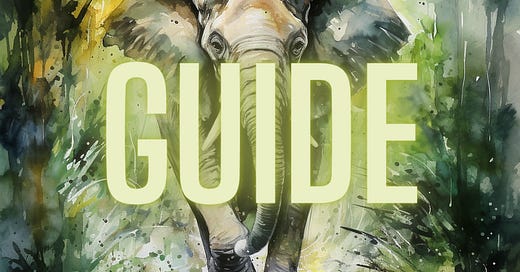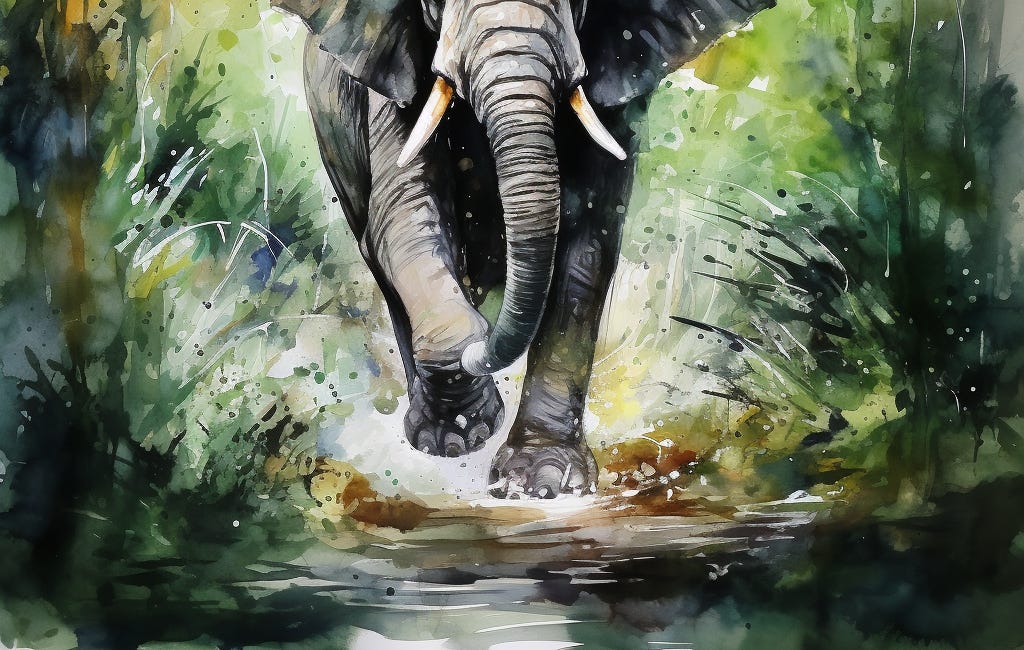For each short story we have created a guide that elaborates on the subject/conflict of the story and offers some more insights about the topic. The guide also offers a quick exercise that helps the reader examine their relationship with the subject and see themselves more clearly.
We recommend reading the short story first, you can find it here:
The short story “The Elephant” illustrates, through the diverging life philosophies and choices of two female friends, how life, often with the aid of difficulties, forces us to reconsider our career paths and reignite the dwindling fire within us. Stella, who tours the world with her band, and Mina, an accountant living in Siena with her husband and two children, meet every year around their birthdays. Their conversations reveal that although Mina envies Stella's adventurous, excitement-filled life a bit, she is largely content with her own, much more predictable fate. That is until a shocking event introduces the unexpected into her life, bringing with it an opportunity disguised as a challenge.
The starkly different attitudes towards life of Stella and Mina were evident early on during their studies. The story also reveals that adaptations and the relinquishment of their judgments were necessary from both sides to remain friends as their life paths began to diverge, akin to the blades of a pair of opening scissors. The way they preserved their friendship over the decades is, on one hand, enviable and, on the other, thought-provoking because many of us would not have succeeded in a similar situation. Our judgments and inflexible view of life often lead to the dissolution of valuable human connections, which we later regret.
'“The Elephant” introduces an element familiar to many: how people, under the influence of social and familial conditioning or even their own expectations, slowly and almost imperceptibly drift away from the things that inspire them, the things they truly love, finding themselves amidst daily tasks without enough time, attention, or energy to pursue their dreams. The problem is that as years pass, we convince ourselves that these dreams were not that important, that we have new dreams now, that our interests have shifted. While this may be true in some cases, more often, it's about giving up on what would make us happy out of fear or due to the pressure to conform, or for someone else we love.
Mina, though she loves her family, has given up on many things to advance her husband's career, ensure her children are well, and be there when her family needs her. Only when her family unit breaks apart does she contemplate where her earlier, more adventurous, exciting, spontaneous, life- and desire-filled self went.
She also realizes that taking risks, standing up for our dreams and our freedom, is exactly like a muscle. If we don't exercise it, it atrophies, and after many years, one may feel incapable of initiating change.
Just as young elephants are convinced by their cruel masters, through being tied to a strong post in their youth, that they cannot escape their bonds, the young elephant remembers for life that the chain on its leg and the post it is attached to are stronger than itself. Even when it has grown to several tons and could easily pull the post from the ground and escape, the adult elephant, believing it is hopelessly tied to the post, never attempts to break free. Similarly, our souls, tethered to the post of daily obligations, feel that after such a long time, they are incapable of breaking out of the rut.
Mina's life turns upside down, and while this comes with much pain and uncertainty, it also creates an opportunity for her to rethink how she wants to continue her life. It has often happened in my life and in the lives of my clients that amidst many obligations, worries, and responsibilities, we have unnoticeably lost something important. A hobby, a dream, a goal that previously gave hope and energy to go about our daily tasks. When one suddenly feels burnt out, lacking the desire to get up, finding nothing in their day inspiring, it's time to look back and closely examine the path we've taken to get here. We need to see what packages of dreams and hope we've left behind here and there because we felt that, alongside the increasing tasks of responsibility, the various expectations of adulthood, and the goals we set as adults, we couldn't bear the weight of those dreams too. It's also worth looking at where on our path we had to let go of those packages of dreams and hope to move forward. Where were the points where we had to lose a lot and what the things we gave up mean to us today.
A great example of this was a client of mine who worked as a middle manager at a multinational corporation and loved her job. She worked for nearly a year to negotiate and finally sign a large, profitable contract with another company after many legal rounds and discussions. She hoped this deal would bring the long-awaited promotion and success. However, she became pregnant and went on maternity leave just as the deal was finalized. She missed the last few weeks. A colleague completed the work, and she watched from home, beside the crib, as her colleague reaped the rewards for the success she had actually worked for. When she returned to her previous position after the birth of two children, the colleague had moved into a senior management position, and despite loving her family, she went to work every day with a bitter taste in her mouth until she finally resigned. To find herself again in her work, she had to process the huge disappointment she faced when someone else took credit for her work, and the subconscious resentment towards her children and husband for having to suffer such a loss because of her family.
Another client was convinced by her mother, after her father's death, to give up her dreams of becoming a painter and study accounting to ensure financial stability. After two decades of grinding, when the company she worked for suddenly closed down, she reflected on how much she had lost by giving up her dreams and how she had completely lost her zest for life. At first, she couldn't believe that she could rekindle the fire she felt in her youth, to look forward to the future with hope and joy, and believe in herself enough to pursue her dream. To start painting again, she had to process the grief stuck from her father's sudden death and the anger towards her mother for having to take care of her.
We can only return to our old, more energetic, joyful, happier selves if we can find the point when it was lost. If we understand what event or trauma caused us to give up on it, and why we precisely buried it.
The following questions can help us find the abandoned packages as we look back on our journey:
What did I enjoy doing when I was little? What was my favorite activity?
How much do I engage in that activity recently? How could I reallocate time and energy to it?
Was there a dream, plan, or goal in my youth that filled me with happiness, but I never realized?
When was the moment I definitively gave up on this plan or dream?
What happened at that time that hurt, scared, disappointed me, and made me change my plans?
How did I feel when that something happened? Who did I feel let down by, who am I angry at, who causes me pain?
Why did I feel that my dream or plan was impossible? That it would never come true?
Does the situation that made me give up on my dream or plan still exist today, or is it a thing of the past?
What resources do I have today that weren't available to me then to realize my dream or plan? Are my chances better now?
What do I need to do to realize my dream or plan?
How can I now realize my plan or dream?
I hope that as more people ask themselves these questions and answer them honestly, they will regain their joy and zest for life. We must recognize when our life situation has changed and understand that we might have a new opportunity for fulfillment, perhaps decades later than we originally hoped for, but at least at some point. Similarly, just as the elephant needs to recognize that it has grown and is now in a different situation with different capabilities than when it was tied to that post, we too must acknowledge our growth and the changes in our circumstances. Recognizing this opens up endless possibilities. All that's left is for us to examine our own “post" and realize that perhaps this time, we're just one movement away from being free.
– Eszter
Home | Notes | Articles | Eszter’s Magic | Literary Bonbons | Short Stories and Guides | Beyond the Book | EWE Issues | Archive | About





